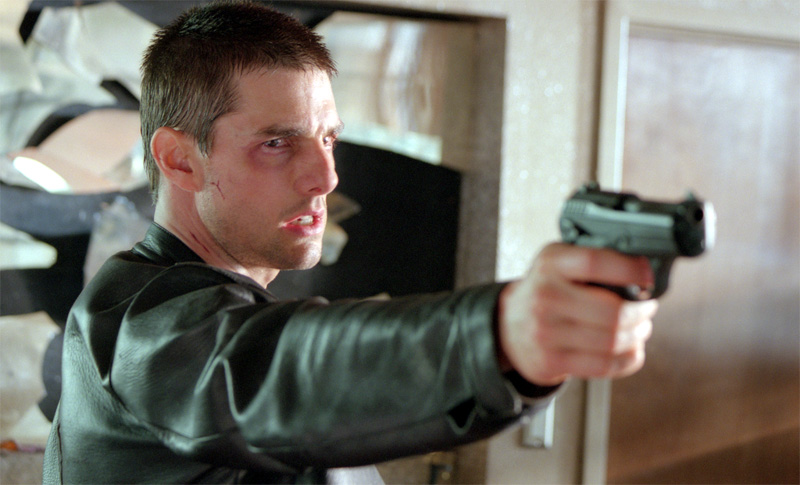 |
 |
 |
 |
 |
 |


By John Grimes
One of the most brilliant aspects of “Minority Report” is how it deals with the philosophical and moral debate surrounding its premise: preventing crimes before they occur. The action of the movie takes place in the year 2045 one week before the vote for the National Precrime Initiative, which will determine whether police departments across the country will adopt precrime. Thitherto, precrime has been limited to the city of Washington D.C.; after six years of effective murder prevention—the murder rate in the city, once one of the bloodiest in the nation has dropped more than 90 percent—leading its purveyors, such as Lamar Burgess (Max von Sydow) to push for its extension as a nationwide law enforcement practice. As one would expect, their efforts have met great resistance from such groups as the ACLU, which argue that such a system leads to the arrest and imprisonment of innocent people. In effect, precrime does call for the arrest of innocent people, yet Lieutenant John Anderton (Tom Cruise) et al would point out that the people the system targets are not truly innocent.
How can people be arrested when they have not actually committed a crime? In the real world we can only prosecute crimes that have been committed in the flesh, not simply in the mind. Once the intention to commit a crime is verbalized, it becomes a threat, and as such it is considered a crime per se. But in the world of “Minority Report” the barriers between premeditation of a crime and the commission of the actual crime itself have been virtually eliminated. Because the Precogs can see into the future to discern the exact date and time when a murder will occur, law enforcement officials thus can detect the premeditation of murder. If it were not for the prescience of the Precogs, the system would cease to exist, its predictive abilities eliminated.
As a natural skeptic, I side with the official from the Department of Justice, Danny Witwer (Colin Farrell), who brings a warrant to investigate the operation of Precrime on the grounds that is morally questionable. Shortly after Witwer’s initial arrival at the Precrime headquarters under the pretense of “observation,” Witwer delimits the DOJ’s cynicism in an exchange with top Precrime Officials, Chief John Anderton, Officer Gordon Fletcher (Neal McDonough), Officer Jeff Knott (Patrick Kilpatrick), and Officer Jad (Steve Harris):
Witwer: I’m sure you all understand the legalistic drawback
to precrime methodology.
Knott: Here we go again.
Witwer: Look, I’m not with the ACLU on this Jeff, but
let’s not kid ourselves. We are arresting individuals who have broken
no law.
Jad: But they will
Fletcher: The commission of the crime itself is absolute metaphysics.
The Precogs see the future, and they’re never wrong.
Witwer: But it’s not the future if you stop it; isn’t
that a fundamental paradox?
Anderton: Yes, it is. You’re talking about predetermination,
which happens all the time. [Rolls ball across table-like surface, and Witwer
catches it and thus prevents it from falling to the ground] Why'd you catch
that?
Witwer: Because it was gonna fall.
Anderton: You sure?
Witwer: Yeah.
Anderton: The fact that you prevented it from happening doesn’t
change the fact that it was going to happen.
Technology already plays a pivotal role in our lives, but to imagine it progressing to as great of an extent as it has in "Minority Report" in half of a century is mind-boggling, to say the least. Although the action in the movie is limited to Washington D.C. (except for the very last scene portraying the Precogs living in isolation on a remote island after the system of Precrime has been abandoned), one gets the impression that it would be virtually impossible, and to a certain extent undesirable, to escape the vice grip that technology has over society. People live in modular apartments and commute to work in pod-like transportation devices that travel on pre-programmed routes. Traffic jams no longer exist in the city, the elimination of an inconvenience representing the benevolent side of this futuristic society. Still, coexisting with such advances are the high rise apartments, slums, crowded city streets, and dirty alleys that are very much present today. As the cliché states, some things change, but others will always stay the same.
However, Spielberg includes other elements that could presage a more uncomfortable, intrusive future. Fifty years of technological advance have not seen American consumerism and hedonism change one bit. Advertisements abound in Anderton's daily experience, from the animated figures on the cereal box at his home to the interactive billboards that scan individuals' retinas and identify them by name in malls and other public places. In the Production Notes of "Minority Report" released by DreamWorks, Speilberg is quoted as saying, ""George Orwell's prophecy really comes true, not in the twentieth century but in the twenty-first," the director explains.”Big Brother is watching us now and what little privacy we have will completely evaporate in twenty or thirty years, because technology will be able to see through walls, through rooftops, into the very privacy of our personal lives, into the sanctuary of our families." The innovation of retinal scanning identification is one of the most powerful--and frightening--portrayed in the movie. Everyone one goes in the city, he or she is continuously being tracked by the government, law enforcement agencies, retail stores, and probably a whole host of other entities. Such a practice would certainly intrude upon my sense of privacy and lead me to exercise heightened caution in every aspect of my life. If I make one mistake I could end up being the target of a government manhunt from which it would be nearly impossible to escape, except if I had the resolve, strength, resources, and connections of Chief John Anderton. Spielberg wanted to portray a society that hinted of dystopia but was overall rather ambiguous in its "goodness."
Philip K. Dick's short story "The Minority Report" was first published in 1956 in the SF magazine Fantastic Universe. The story is not known as one of his most famous, although I thoroughly enjoyed reading it. However, my view is naturally artificial because I saw the movie before reading the story; hence, I will never know how I would have reacted from the story alone. While premise of the story, the two main characters (Anderton and Witwer), and the general plot structure remain in Spielberg's adaptation of the short story, much of the plot of Dick's story is abandoned. In the short story, as in the movie, Chief Anderton still presides over a successful Precrime system until Witwer enters the picture. Shortly thereafter, the Precogs implicate Anderton in the future murder of an individual who he has yet to meet, at which point Anderton wastes little time in deliberation before deciding to flee before he can be apprehended. In both the movie and the short story a chase ensues. From that point on, the similarities between the movie and the short story become fewer, however.
The short story depicts Anderton making a hasty escape home to pack his belongings before jetting off to a frontier planet, all the while leaving his wife, who also works in the Department of Precrime, behind. Not long after he reaches his house and starts packing, a group of army officers picks him up and brings him to the residence of General Leopold Kaplan. From there two officers load him into a car and head toward Precrime headquarters, purportedly to turn him into Witwer and have him incarcerated. However, they never make it there; they encounter a storm and get into a horrible accident. Anderton escapes from the wreckage, saved by a man named Fleming, who gives Anderton false identification and cash to facilitate his escape. Like Anderton in the movie, the Anderton of Dick's short story also finds out about the "minority report" during his evasion of the authorities, prompting him to make a precarious return to Precrime headquarters in order to get the "minority report" so he can prove his innocence to Witwer.
Whereas Spielberg's Anderton discovers that he doesn't actually have a minority report, Dick's Anderton discovers that not only does he have one minority report, but three. In Dick's short story the Precogs' predictions do not correspond temporally as they do in the movie. The first Precog predicts that Anderton will murder Kaplan. Shortly thereafter, the second Precog predicts that Anderton will not murder Kaplan because of Anderton's privileged position to the information contained in the first Precog's report (since Anderton learned of the first Precog's report before he committed the murder, he would adapt his behavior). However, the third Precog then overrules the second one and produces his own "minority report" implicating Anderton in the murder of Leopold Kaplan. Although it seems like a very complicated sequence, it makes sense and is much more interesting than the movie. In the end Dick's Anderton does kill Kaplan, vindicating the Precrime system for Commissioner Witwer.
The holes in the movie's plot that critics mention do not exist in the short story. The rivalry between the Army and Precrime in the short story explains a lot; the city had once been under martial law, but the invention of Precrime eliminated 99.8% of felony crime and, thus, eliminated the need for military rule. As a result, Kaplan et al try to use Anderton's case to discredit the system, mistakenly believing that the Precogs' implication of him was erroneous. Another major difference between the short story and the movie is that Dick depicts the Precrime system as continuing in existence, with Anderton leaving Witwer in charge and Anderton and his wife depart for another planet.
Anxiously, Witwer trotted along beside the truck, his smooth, blond face creased with worry. "Will it happen again? Should we overhaul the setup?"
"It can happen in only one circumstance," Anderton said. "My case was unique, since I had access to the data. It could happen again -- but only to the next Police commissioner. So watch your step." Briefly, he grinned, deriving no inconsiderable comfort from Witwer's strained expression. Beside him, Lisa's red lips twitched and her hand reached out and closed over his.
"Better keep your eyes open," he informed the young Witwer. "It might happen to you at any time."
| The Essentials | Action Summary | Personal Criticism & Analysis | Reviews | Resources & Links | Images |
©2003 John Grimes <jgrimes@depauw.edu>